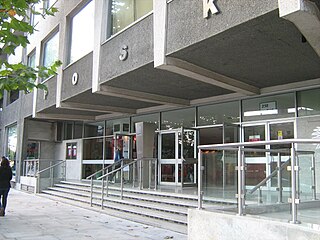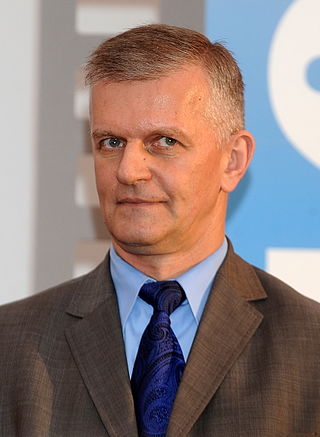Related Research Articles
The Republic of Poland is a Central European country and member of the European Union and NATO, among others. Poland wields considerable influence in Central and Eastern Europe and is a middle power in international affairs. The foreign policy of Poland is based on four basic commitments: to Atlantic co-operation, to European integration, to international development and to international law.

The złoty is the official currency and legal tender of Poland. It is subdivided into 100 grosz (gr). It is the most traded currency in Central and Eastern Europe and ranks 21st most-traded in the foreign exchange market.

The Narodowy Bank Polski, often abbreviated to NBP, is the central bank of Poland, founded in 1945. It controls the issuing of Poland's currency, the Polish złoty. The bank is headquartered in Warsaw, and has branches in 16 major Polish cities. The NBP represents Poland in the European System of Central Banks, an EU organization.

Bolesław Ignacy Florian Wieniawa-Długoszowski was a Polish general, adjutant to Chief of State Józef Piłsudski, politician, freemason, diplomat, poet, artist and formally for one day the President of the Republic of Poland.

The House of Lubomirski is a Polish princely family. The Lubomirski family's coat of arms is the Drużyna coat of arms, which is similar to the Szreniawa coat of arms but without a cross.

Polski Słownik Biograficzny is a Polish-language biographical dictionary, comprising an alphabetically arranged compilation of authoritative biographies of some 25,000 notable Poles and of foreigners who have been active in Poland – famous as well as less-well-known persons – from Popiel, Piast Kołodziej, and Mieszko I, at the dawn of Polish history, to persons who died in the year 2000.

Tydzień Polski is the successor title to the Dziennik Polski i Dziennik Żołnierza, commonly known as Dziennik Polski, The Polish Daily, which was the first Polish language Daily newspaper continuously published in the United Kingdom from 12 July 1940 to July 2015. On 17 July 2015 it became a weekly publication, Tydzień Polski, The Polish Week.

Tadeusz Żenczykowski, pseudonym Kania, Kowalik and Zawadzki was a Polish lawyer, political activist and soldier in the Armia Krajowa during World War II, taking part in the Warsaw Uprising of 1944. Immediately after the war, he was a member of the anti-communist conspiracy in Poland. In 1945, he emigrated and became a journalist and deputy chief of the Polish Section of Radio Free Europe, historian and publicist.
Artur Żmijewski is a Polish visual artist, filmmaker and photographer. During the years of 1990–1995 he studied at Warsaw Academy of Fine Arts. He is an author of short video movies and photography exhibitions, which were shown all over the world. Since 2006 he is artistic editor of the "Krytyka Polityczna".

Beata Obertyńska,, born July 18, 1898, near Skole, died May 21, 1980 in London was a Polish writer and poet.

The Polish Social and Cultural Centre is a Polish cultural centre in west London, England. It was funded by public subscription and founded in 1967, on the initiative of Polish engineer Roman Wajda, at 238–246 King Street, Hammersmith.
Jarosław Adam Kilian, born in Poland in 1962, is a Polish director for theatres, operas and TV, an art historian, and a pedagogue. He is the son of Polish designer Adam Kilian.

Omenaa Mensah is a Polish philanthropist, entrepreneur, investor, journalist and presenter, and art collector.

Janusz Waldemar Cisek was a Polish historian, academic lecturer, director of the Pilsudski Institute and Polish Army Museum, from 2012 to 2013 Undersecretary of State in the Ministry of Foreign Affairs.

Adam Szymon Pragier was a Polish economist, Doctor of Jurisprudence professor at the Free Polish University, socialist activist, politician, member of the Polish Legions and writer. A minister of information and documentation in the Polish government-in-exile in London, he upheld for the rest of his life its legal continuity in the struggle for the restoration of Poland as a sovereign state.
The Fund for National Culture was a Polish state foundation with headquarters in Warsaw, operating in the Second Polish Republic, between 1928–1939 and later during the war with the support of the Polish government in exile.

Michał Andrzej Kobosko is a Polish press journalist and political activist. He is the Vice-president of the Poland 2050 association and chairman of the Poland 2050 party by Szymon Hołownia.

Konrad Ksawery Swinarski – Polish theatrical, television, film and opera director and stage designer.

Stefania Kossowska, née Szurlej was a Polish literary editor, political activist, writer and broadcaster.
References
- ↑ Polska Fundacja Kulturalna (in Polish). encyklopedia PWN. 3959731.
- ↑ Murawski, Michal (2020). "The Palace of Culture". In Hatherley, Owen (ed.). The alternative guide to the London boroughs. London: Open City. pp. 226–233. ISBN 9781916016910.
- ↑ "Polska Fundacja Kulturalna Limited". Charity Commission for England and Wales . Retrieved 14 April 2023.
- 1 2 "Polska Fundacja Kulturalna. 40-lecie działalności wydawniczej 1963-2003 - Wydawnictwo LTW" (in Polish). ltw.com.pl. Retrieved 25 January 2020.
- ↑ archive: https://web.archive.org/web/20200116111712/http://www.ltw.com.pl/presta/glowna/442-polska-fundacja-kulturalna-40-lecie-dzialalnosci-wydawniczej-1963-2003.html. 2020
- ↑ Czajka, Michał; Kamler, Marcin; Sienkiewicz, Witold (1995). Leksykon Historii Polski (in Polish). Warsaw: Wiedza Powszechna. p. 913. ISBN 83-214-1042-1. OCLC 69545827.